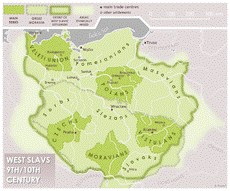
Wends

Wends (Old English: Winedas, Old Norse: Vindr, German: Wenden, Winden, Danish: Vendere, Swedish: Vender) is a historic name for West Slavs living near Germanic settlement areas. It does not refer to a homogeneous people, but to various peoples, tribes or groups depending on where and when it is used.
In the Middle Ages the term "Wends" often referred to Western Slavs living within the Holy Roman Empire, though not always. Mieszko I, the first historical prince of Poland, also appeared as "Dagome, King of the Wends" (Old Norse: Vindakonungr). The name has also survived in Finnic languages (Finnish: Venäjä, Estonian: Vene, Karelian: Veneä) denoting Russia.
History of the Wends
Rise (500–1000 AD)
As a part of the Slavic migrations in the first millennium, splitting the just evolved Slav ethnicity into Southern, Eastern and Western groups, some West Slavs moved into the areas between the Elbe and Oder Rivers from east to west and from south to north. There, they assimilated the remaining Germanic population that had not left the area in the Migration period. Their German neighbors adapted the term they had been using for peoples east of the Elbe River before to the Slavs, calling them Wends as they called the Venedi before and probably the Vandals also.
While the Wends were arriving in so-called Germania Slavica as large homogeneous groups, they soon divided into a variety of small tribes, with large strips of woodland separating one tribal settlement area from another. Their tribal names were derived from local place names, sometimes adopting the Germanic tradition (e.g. Heveller from Havel, Rujanes from Rugians). Settlements were secured by round burghs made of wood and clay, where either people could retreat in case of a raid from the neighboring tribe or used as military strongholds or outposts.
Some tribes unified to larger, duchy-like units. E.g., the Obotrites evolved from the unification of the Holstein and Western Mecklenburg tribes led by mighty dukes known for their raids into German Saxony. The Lutici were an alliance of tribes living between Obotrites and Pomeranians. They did not unify under a duke, but remained independent and had their leaders meet and decide in the temple of Rethra.
In 983, many Wend tribes participated in a great uprising against the Holy Roman Empire, which before had established Christian missions, German colonies and German administrative institutions (Marken such as Nordmark and Billungermark) in pagan Wendish territories. The uprising was successful and the Wends delayed Germanisation for about two centuries.
Decline (1000–1200 AD)
After that victory, Wends were under increasing pressure from Germans, Danes and Poles. The Poles invaded Pomerania several times. The Danes often raided the Baltic shores (and, in turn, were often raided by the Wends). The Holy Roman Empire and its margraves tried to restore their marches.
In 1068/69, a German expedition took and destroyed Rethra, one of the major pagan Wend temples. The Wendish religious center shifted to Arkona thereafter. In 1124 and 1128, the Pomeranians and some Luticis were baptised. In 1147, the Wend crusade took place.
In 1168 during the Northern Crusades, Denmark mounted a crusade led by Bishop Absalon and King Valdemar the Great against the Wends of Rugia in order to convert them to Christianity. They captured and destroyed Arkona, the Wendish temple fortress, and tore down the statue of the Wendish god, Svantevit. With the capitulation of the Rugian Wends, the last independent pagan Wends were defeated by the surrounding Christian feudal powers.
From 12th to 14th century, German colonists were called into the Wend lands and settled there in large numbers, transforming the area from a Slavic to a Germanic culture. The settlers were called in by local dukes and monasteries to repopulate land devastated in the wars, to cultivate the large woodlands and heavy soils that have not been settled before, and to found cities as part of the "Ostsiedlung" (German eastward expansion).
The German population assimilated most of the Wends, making them disappear as an ethnic minority except for parts of the Sorbs. The Polabian language survived until the beginning of the 19th century in what is now the German state of Lower Saxony. Yet, many place names and some family names in eastern Germany still are of Wendish origin today. Also, the Dukes of Mecklenburg, of Rügen and of Pomerania had Wendish ancestors.
Between 1540 and 1973, the kings of Sweden were officially called king of the Swedes, the Geats and the Wends (in Latin translation king of Suiones, Goths and Vandals) (Sw. Svears, Götes och Wendes Konung). Since the Middle Age, the kings of Denmark and Denmark–Norway carried the titles King of the Wends and Goths. The use of both titles was discontinued in 1972.